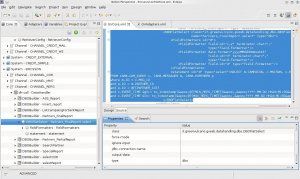Difference between revisions of "DBOFlatSelect"
(→{{GVESB}} configuration) |
(→{{GVESB}} configuration) |
||
| Line 9: | Line 9: | ||
Must be defined for each field the FieldFormatter, that allows you to force the formatting of the values extracted from the database | Must be defined for each field the FieldFormatter, that allows you to force the formatting of the values extracted from the database | ||
| − | + | It is used by [[DBOBuilder]]. | |
| + | |||
| + | The following table shows the DBOFlatSelect attributes: | ||
| + | {|class="gvtable" | ||
| + | ! Attribute !! Type !! Description | ||
| + | |- | ||
| + | | type || fixed || This attribute must assume the value '''dbo''' | ||
| + | |- | ||
| + | | class || fixed || This attribute must assume the value '''it.greenvulcano.gvesb.datahandling.dbo.DBOFlatSelect''' | ||
| + | |- | ||
| + | | name || required || DOFlatSelect name | ||
| + | |- | ||
| + | | force-mode || required || (caller or db2xml): Force mode of the DBO, can be used in [[DBOBuilder]] whit more heterogeneous [[DBOBuilder#DBO|DBO]]. <br/> Mode:<br/> caller - inherit the mode of the caller<br/> db2xml - data extraction mode | ||
| + | |- | ||
| + | | jdbc-connection-name || required || DataSource JNDI name. <br/> Override connection defined in [[DBOBuilder]]. | ||
| + | |- | ||
| + | | ignore-input || optional || (true or false): Tells the engine do not use the input data. | ||
| + | |- | ||
| + | | output-data || optional || The default is the value of @name-Output. | ||
| + | |} | ||
| − | |||
| − | |||
| − | |||
| − | |||
| − | |||
| − | |||
| − | |||
For example: | For example: | ||
Revision as of 15:49, 30 March 2012
Description
The DBOFlatSelect element represents the DBO optimized for select operations and conversion in CSV rows.
GreenVulcano® ESB configuration
DBOFlatSelect allows you to run a select on the database. The result of the select will be a CSV document.
Must be defined for each field the FieldFormatter, that allows you to force the formatting of the values extracted from the database
It is used by DBOBuilder.
The following table shows the DBOFlatSelect attributes:
| Attribute | Type | Description |
|---|---|---|
| type | fixed | This attribute must assume the value dbo |
| class | fixed | This attribute must assume the value it.greenvulcano.gvesb.datahandling.dbo.DBOFlatSelect |
| name | required | DOFlatSelect name |
| force-mode | required | (caller or db2xml): Force mode of the DBO, can be used in DBOBuilder whit more heterogeneous DBO. Mode: caller - inherit the mode of the caller db2xml - data extraction mode |
| jdbc-connection-name | required | DataSource JNDI name. Override connection defined in DBOBuilder. |
| ignore-input | optional | (true or false): Tells the engine do not use the input data. |
| output-data | optional | The default is the value of @name-Output. |
For example:
<?xml version="1.0" encoding="UTF-8"?>
<DBOFlatSelect class="it.greenvulcano.gvesb.datahandling.dbo.DBOFlatSelect"
name="Partners_FinalReport-select" type="dbo">
<FieldFormatters id="0">
<FieldFormatter field-id="1,2,3" terminator-char="," type="field-formatter"/>
<FieldFormatter date-format="yyyyMMddHHmmssSSS"
field-id="4" type="field-formatter"/>
</FieldFormatters>
<statement id="0" type="select">
SELECT m.CAMPAIGN, c.MSISDN, c.EVENT_TIME, c.EVENT
FROM CAMA.CDR_EVENT c, CAMA.MESSAGES m, CAMA.PARTNERS p
where m.ID = c.MSG_ID
and p.ID = m.PARTNER_ID
and p.ID = @{{PARTNER_ID}}
and c.EVENT_TIME <= to_timestamp('@{{MIN_REPG_TIME}}','YYYY-MM-DD HH24:MI:SS')
and c.EVENT_TIME < to_timestamp(‘@{{MAX_REPG_TIME}}’,’YYYY-MM-DD HH24:MI:SS')
</statement>
</DBOFlatSelect>
will generate the output:
TEST_1000130000,+10020000000,20111222170000000
TEST_1000130000,+10020000001,20111222170000000
TEST_1000130000,+10020000002,20111222170000000
TEST_1000130000,+10020000003,20111222170000000
TEST_1000130000,+10020000004,20111222170000000
TEST_1000130000,+10020000005,20111222170000000
TEST_1000130000,+10020000006,20111222170000000
Might contain the following sub-elements:
